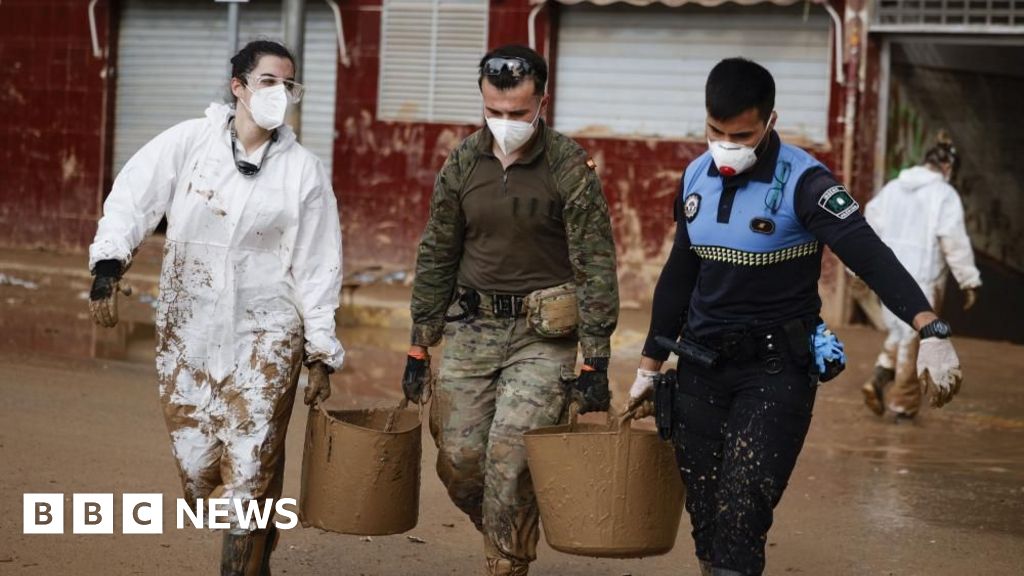ARTICLE AD BOX
By Holly Honderich & Shrai Popat
BBC News, Washington
Image source, Getty Images/BBC
About 30 years ago, just months after starting work as a prostitute, Maxine Doogan became pregnant.
She had been with a new client at a massage parlour in Anchorage, Alaska, when she realised he had removed his condom surreptitiously during intercourse. Shocked, she ran to the bathroom. When she returned the client was gone.
Doogan, then in her mid-twenties, went to a nearby health clinic for a round of tests for sexually transmitted infections and later gave a silent thanks for each negative result.
Six weeks later, Doogan sought an abortion. It cost her around $300 (about £220 at today's conversion rate) and after the procedure she couldn't work for a month.
What the client did was wrong. But as far as she knew it wasn't illegal.
"There's just no recourse for something like that," she said.
Now, in one US state there is.
Last Thursday, California Governor Gavin Newsom signed into law a bipartisan bill that outlaws non-consensual condom removal, known as "stealthing". The new legislation adds the act to the state's civil definition of sexual battery, making California the first US state to render stealthing illegal.
The law gives victims a clear legal remedy for the assault that Doogan, who now lives in San Francisco, suffered decades ago. And advocates say it marks a sea change for other survivors who, unlike Doogan, might now have their day in court.
"We wanted to make sure that it's not only immoral, but illegal," said California Assemblywoman Cristina Garcia who introduced the bill.
Image source, Getty Images/BBC
Image caption, Assemblywoman Cristina Garcia introduced the bill, after two previous attempts to pass a stealthing law had failedGarcia has been working on some version of this legislation for years. In 2017 and again in 2018, she introduced a bill that would have made stealthing a criminal offence, and allowed prosecutors to seek jail time for perpetrators. These bills either died on the floor or did not get a hearing.
This new version, which amends just the civil code, passed in the California legislation with no opposition. Survivors can sue offenders for damages but no criminal charges can be brought forward.
"I still think this should be in the penal code," Garcia told the BBC. "If consent was broken, isn't that the definition of rape, or sexual assault?"
Legislative analysts have said that stealthing could be considered misdemeanour sexual battery, even though it is not explicitly named in the criminal code. But Garcia's new law removes any ambiguity for civil claims which, experts say, will make it easier for survivors to pursue their cases.
"We can start to talk about it in a way where we have a common language," Garcia said.
Garcia said she was inspired to bring the topic of stealthing to the House floor after reading a 2017 Yale Law School research paper by then-student Alexandra Brodsky - who is now widely credited with bringing the term into popular use.
Brodsky, who now works as a civil rights lawyer and is the author of Sexual Justice - which looks at how to respond fairly to sexual assault - detailed a number of stories in her paper from survivors in the context of otherwise consensual romantic or sexual relationships.
Their accounts often started the same way, Brodsky wrote. "I'm not sure this is rape but…"
They detailed their fear of sexually transmitted infections and pregnancy, as well as intense feelings of violation and betrayal. But the survivors Brodsky spoke to - many of whom reported being raped previously - did not describe stealthing as equivalent to sexual assault.
People weren't making that connection yet, Brodsky said. "I think a big part of the problem was that a lot of people thought they were the only person this had happened to," she said.
Image source, Getty Images/BBC
Image caption, Brodsky's 2017 paper is now widely credited for bringing the term "stealthing" into popular useBut research shows stealthing is "depressingly common", according to analysis from California's Senate judiciary committee in assessing Garcia's bill.
A 2019 paper published in the National Library of Medicine found that 12% of women ages 21 to 30 reported experience with stealthing. That same year, researchers with Monash University in Australia, found that one in three women and one in five men who have sex with men had been subjected to the practice.
And another 2019 study found that almost 10% of men reported removing a condom during sex without consent.
In her paper, Brodsky quoted a well-known stealthing blogger, who used his now-defunct site to give advice to other men on how to secretly remove condoms without attracting attention.
It's a woman's duty to spread their legs, commenters wrote, and a man's right to "spread his seed".
But while awareness of stealthing has grown, the legislative response has lagged.
Even in countries where stealthing has been deemed sexual assault - including the UK, New Zealand and Germany - it's rarely prosecuted, in part because of difficulties in proving intent.
This is the advantage of civil suits. The burden of proof is lower than in criminal cases, and the decision to pursue a claim rests with survivors, not prosecutors.
And both Brodsky and Garcia said there's inherent significance in the state officially labelling stealthing as an illegal act.
"Imagine what it's going to feel like when they [survivors] see that the state of California thinks that they don't deserve to be treated this way," Brodsky said. "That it deserved a legal solution."
The bill was supported by the Erotic Service Providers Legal, Educational and Research Project (ESPLERP), an advocacy organisation founded and run by Doogan.
The law will allow sex workers to sue clients who remove condoms, she said, and hopefully pave the way for further legal protection for sex workers and other groups typically marginalised by the criminal justice system.
Image source, Getty Images/BBC
"[Stealthing] can happen to anybody," Doogan said.
There's still the problem of sexual assault cases being taken up at all. Those who make these claims are often met with "scrutiny and scepticism", according to Brodsky. And when it comes to stealthing, this response is intensified because, "by definition, the harm happens after they've consented to sex".
But the move has been celebrated as an important first step, especially after recent efforts to pass similar legislation in New York and Wisconsin failed.
"I'm proud that California is the first in the nation, but I'm challenging other state legislators to follow and to follow quickly," Garcia said. "One down, 49 to go."
Graphics by Angélica Casas

 3 years ago
42
3 years ago
42








 English (US)
English (US)